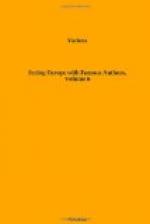Dear Cracow! Never again it seems to me, shall I come so near to the deathless hidden sentiment of Poland as in those first moments. It would be no use to tell her to take heart, that there may be brighter days coming, and so forth. Lemberg may feel so, Lemberg that has the feelings of any other big new town, the strength and the determination; but Cracow’s day was in the long ago, as a gay capital, a brilliant university town full of princes, of daring, of culture, of wit. She has outlived her day, and can only mourn over what has been and the times that she has seen; she may be always proud of her character, of the brave blood that has made scarlet her streets, but she can never be happy remodeled as an Austrian garrison town, and in the new Poland—the Poland whose foundation stones are laid in the hearts of her people, and that may yet be built some day—in that new Poland there will be no place for aristocratic, high-bred Cracow.
During my stay in the beautiful butter-colored palace that is now a hotel, I went round the museums, galleries, and universities, most if not all of which are free to the public. It would be unfair to give the idea that Cracow has completely fallen to decay. This is not the case. Austria has erected some very handsome buildings; and a town with such fine pictures, good museums, and two universities, can not be complained of as moribund. At the same time, I can only record faithfully my impression, and that was that everything new, everything modern, was hopelessly out of tone in Cracow; progress, which, tho’ desirable, may be a vulgar thing, would not suit her, and does not seem at home in her streets.
About the Florian’s Thor, with its round towers of old, sorrel-colored brick, and the Czartoryski Museum, there is nothing to say that the guide-book would not say better. In the museum, a tattered Polish flag of red silk, with the white eagle, a cheerful bird with curled tail, opened mouth, chirping defiantly to the left, imprest me, and a portrait of Szopen (Chopin) in fine profile when laid out dead. For amusement, there was a Paul Potter bull beside a Paul Potter willow, delightfully unconscious of a coming Paul Potter thunderstorm, and a miniature of Shakespeare which did not resemble any of the portraits of him that I am familiar with. Any amount of Turkish trappings and reminiscences of Potocki and Kosciuszko, of course. As I had no guide-book, I am quite prepared to learn that I overlooked the most important relics.
In the cathedral, away up on the hill of Wawel, above the river Vistula (Wisla) I prowled about among the crypts with a curious specimen of beadledom who ran off long unintelligible histories in atrocious Viennese patois about every solemn tomb by which we stood. So far as I was concerned it might just as well have been the functionary who herds small droves of visitors in Westminster Abbey. I never listen to these people, because (i) I do not care to be informed; and




